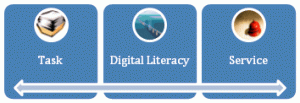This is a working draft of a task-service model to help us position digital literacy. We believe this is important so that we can frame and shape the developing digital literacy project in a way which directly supports learning. It is still very much a work in progress and we aim to refine the model through its application to authentic tasks.We welcome any thoughts and comments.
Bridging between tasks and services
At some stage, most academic and professional challenges involve basic information tasks. At a simple level these tasks are concerned with:
- searching i.e. seeking, locating, finding, browsing
- retrieving i.e. getting, obtaining, acquiring
- managing i.e. organising, sorting, arranging, structuring, cataloguing
- manipulating [1] i.e. transforming, re-representing, formatting, visualising
- creating [2] i.e. producing, generating, authoring, making
- disseminating i.e. publishing, making available, sharing, sending, delivering
- exchanging/communicating [3] i.e. dialogue, discussion, conversation[4]
Breaking down complex tasks into constituent activities enables mappings to be made to the services we use to perform them.
Types of service
The service used to perform a task
- content – providing data/information in the form of physical and digital media artifacts
- tools – providing physical equipment, infrastructure and resources; digital technologies, software and applications
- people – providing knowledge, expertise, information
- processes – work that is done on someone’s behalf either by a person or system (characterised as a business process or workflow)
Example: A complex task, such as giving a presentation, can be broken down into a range of activities[5]. For example: searching, retrieving, creating and disseminating information (are all performed through utilising digital literacy, information literacy and social literacies).
Learning Literacies: the key to bridging between tasks and services
Having broken down a high-level task into basic activities, it is possible to ask questions about what kinds of service might be useful to help perform them. The ability to make informed decisions such as; ‘whether or not to employ digital technology (having understood the options)’, ‘which technology to use’ and ‘how’ is what bridges the gap between a task and available services.
As a project we wish to take a task-based approach to digital literacy and to support the primary aims of students, staff and researchers within the university and to truly embed digital literacy in authentic learning tasks. Therefore we propose adopting this model as a broad task based framework within which we are able to analyse the requirements of our stakeholders.

[1] The data remains unchanged
[2] Creates new data/information
[3] There is reciprocation
[4] This list is inspired by the SCONUL seven pillars model for information literacy, however, for the purpose of this project evaluation, identification, scoping and planning are not included because they are understood to be high-level cognitive activities performed across many of the basic data/information tasks.
[5] Not all constituent basic activities are mandatory when performing a complex task
